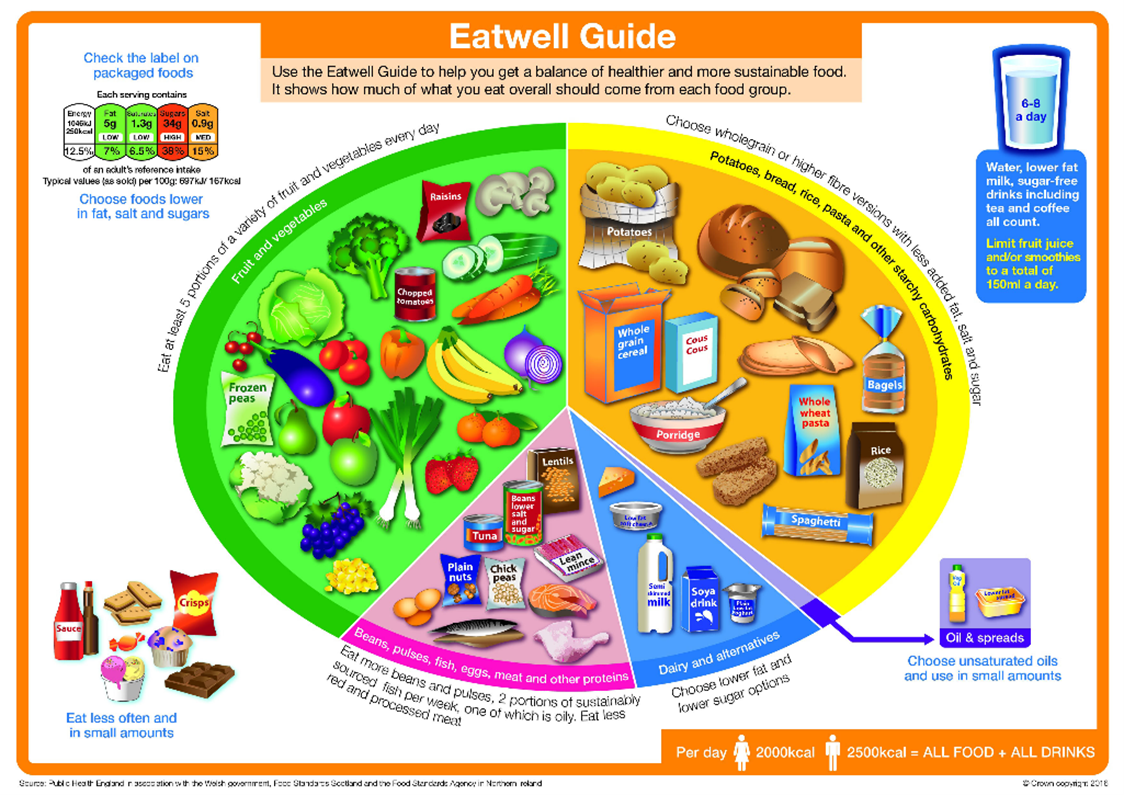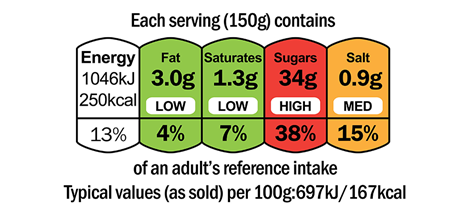Maintaining a healthy body weight is an important part of developing and maintaining a healthy lifestyle. A person’s weight is influenced by many factors, such as genetics, medication, mental health, history of dieting, and other events that may have happened during their life. This means that a person’s healthy weight is the stable weight achieved when they introduce healthy behaviours into their lifestyle. These healthy behaviours may include:
- Eating a wide variety of healthy foods such as foods mentioned in the Eatwell Guide below.
- Being mindful of portion sizes and ensuring all food categories are eaten at the recommended amount.
- Fully respecting your hunger and fullness cues by paying attention to them and responding with that is needed.
- Acknowledging emotional or stress eating and developing different coping strategies.
- Consuming alcohol within identified limits and considering current guidance. To find out more about alcohol consumption, visit Alcohol advice – NHS (www.nhs.uk)
- Stopping smoking tobacco products. To find out more, visit Smoking Cessation | NHS Orkney (scot.nhs.uk)
- Discovering a form of physical activity that you enjoy and is sustainable within your lifestyle.
- Having positive social support around you.
- Developing self-worth, self-care, and a positive body image.
- Ensuring we get around 7 to 9 hours of sleep to allow rest and repair within our mind and body.
Improving what you eat
- Aim for at least 5 portions of a variety of fruit and veg every day.
- Base meals on potatoes, bread, rice, pasta, or other starchy carbohydrates; choosing wholegrain versions where possible.
- Try to have some dairy or dairy alternatives (such as soya or oat drinks), choosing lower fat and lower sugar or sweetener options where possible.
- Eating beans, pulses, fish, eggs, meat, meat alternatives and other proteins (including 2 portions of fish every week, one of which should be oily).
- Choose unsaturated oils and spreads (such as vegetable or sunflower oil) and eat in small amounts.
- Try to drink 2 to 3 litres of fluid a day.
- If consuming foods and drinks high in fat, sugar, or salt, try to have these less often and in small amounts.
The Eatwell Guide
Below is the Eatwell Guide – this guide represents what your daily intake of food and drink should look like. To find out more, visit: Eatwell Guide – Food and nutrition | NHS inform

Hydration
The Eatwell Guide recommends aiming to drink 6-8 cups or glasses of fluid per day. This can include water, lower-fat milk, and sugar free drinks such as tea or coffee. Staying hydrated helps us to live a healthier life, reduces the risk of dehydration, and improves our concentration and focus. To find out more, visit:
Portion Sizes
Portion sizes are an important part of having a nutritious diet and living a healthy lifestyle. The diagrams below show what you should aim for on your plate, and how you can measure this with your hands. It is important to make sure you aren’t overeating or undereating on certain food groups. You should aim to have a bit of each of the food groups on your plate at each meal: fruit and vegetables, carbohydrates, protein, healthy fats, and dairy.
To find out more about eating a balanced diet, visit: Eating a balanced diet – NHS (www.nhs.uk)

Food Labels
Being aware of food labels and packaging can help you to choose healthier options and live a healthier and balanced lifestyle. They can help you to decide between products and allow you to check which foods are high in fat, salt and added sugars. The image below is an example of the traffic light system that is used on food labels.

- Green = low level (aim to eat foods with as many green lights as possible)
- Yellow = medium level (aim to eat foods with yellow lights in moderation)
- Red = high level (try to eat fewer foods that have one or more red lights)
When shopping, aim for as many green traffic lights as possible. To find out more about food labels, visit: Food labels – NHS (www.nhs.uk)
Our current services – Second Nature
One of NHS Orkney’s current adult healthy weight services is the digital weight management programme Second Nature.
Diets are difficult and often fail because they tell you when to eat, rather than teaching you why you eat and how to change your eating habits. The Second Nature app uses behavioural science to retrain your thought patterns to make healthy choices automatically, and these thoughts can help to develop a healthy lifestyle in the long run. By building healthier habits that become Second Nature, losing weight feels easier and lasts longer.
What will I get?
Your Second Nature programme is delivered through the Second Nature app.
Get the support you need to build and maintain healthy habits in the long term.
Support
Your own registered nutritionist and community.
- Access to a qualified nutritionist and peer-support group to face challenges together
- Connect with others to learn and discuss specific aspects of the programmes, such as exercise, stress, sleep, mindset, weight loss plateaus, menopause, and more!
Education
Learn about the science of nutrition and track your progress
- Read or listen to daily educational articles to help you learn more about the science of nutrition and the psychology of building habits
- Ability to track your weight, steps, and sleep! Plus, set your own custom habits to track in order to see your progress and reach your goals
Food
300+ delicious recipes and a meal planner
- Access hundreds of delicious and balanced recipes that cater to all dietary preferences
- Create personalised meal plans to suit your lifestyle. You can also generate a personalised shopping list to save time and keep you organised.
1:1 weight loss intervention – weight loss you can see
12 sessions of input and support from a registered dietitian, targeting weight loss and promoting a healthier, sustainable lifestyle. This involves a personalised eating plan tailored to promote weight loss and ultimately achieve weight loss maintenance. The sessions include support with diet, physical activity, eating behaviours and habits, shopping, cooking, and eating out, and changing thoughts around food and eating.
If you are interested in accessing any of these programmes or would like further information, contact the NHS Orkney Dietetics Team via:
- Phone: 01856 888219
- Email: ork.dietetic@nhs.scot
Useful Websites
Type 2 Diabetes | NHS Orkney (scot.nhs.uk)
Activity and exercise | NHS Orkney (scot.nhs.uk)
12 Week Weight Management Programme | NHS inform
Food labels – NHS (www.nhs.uk)